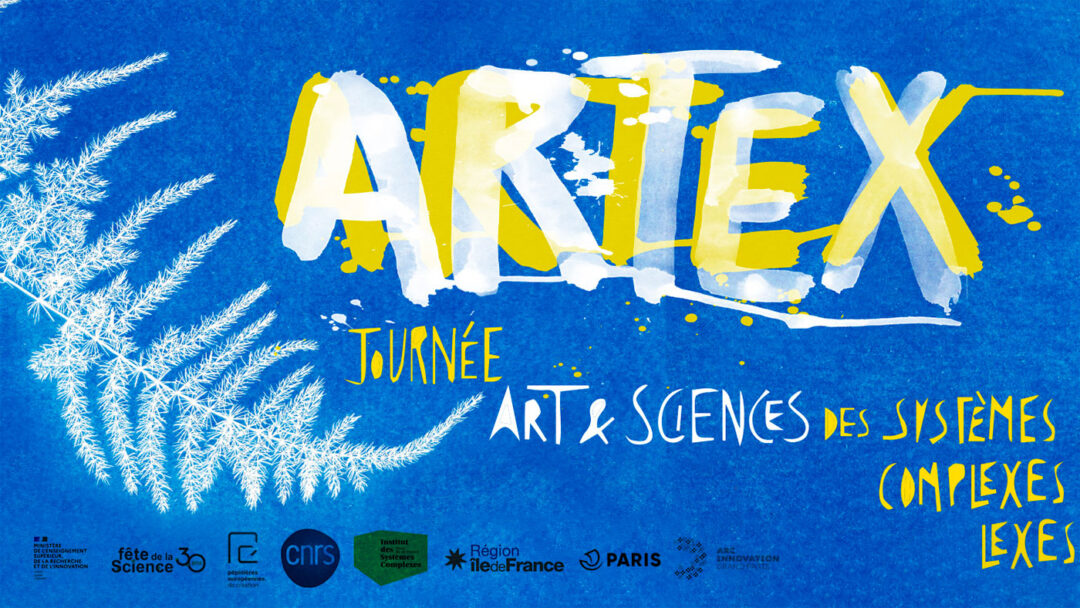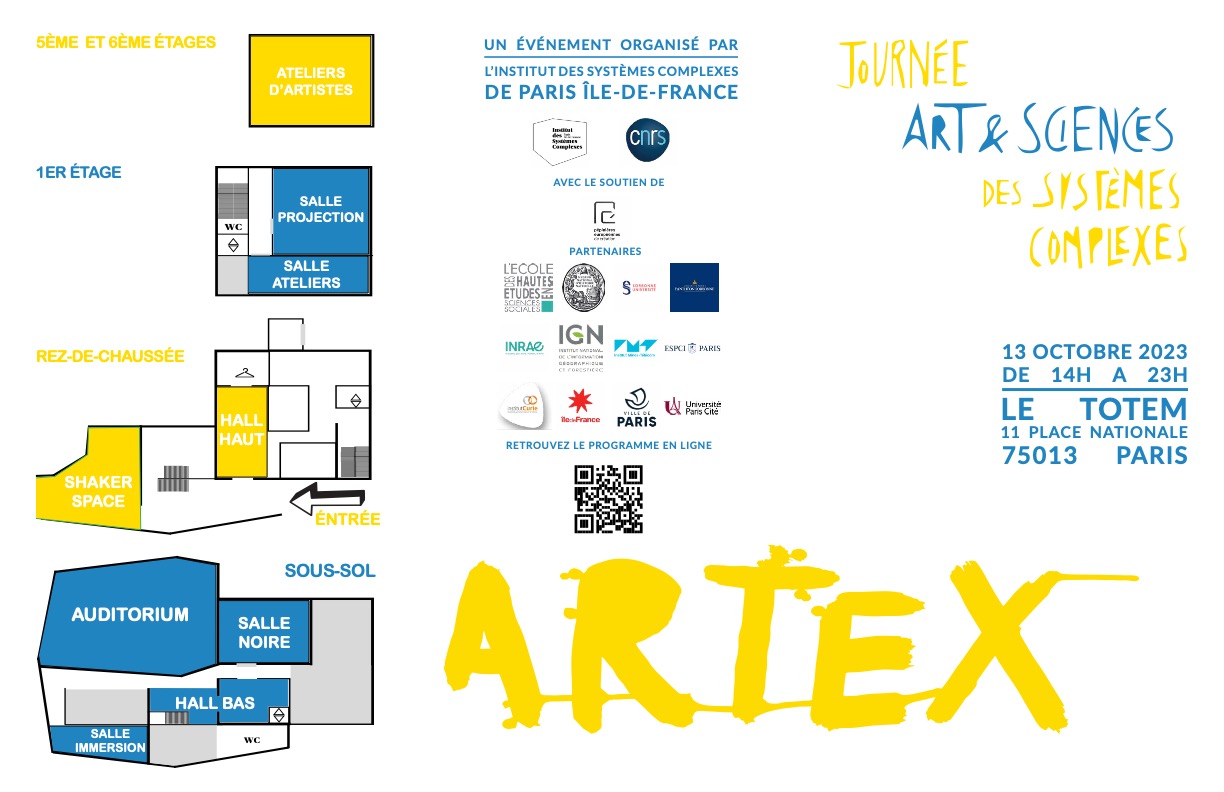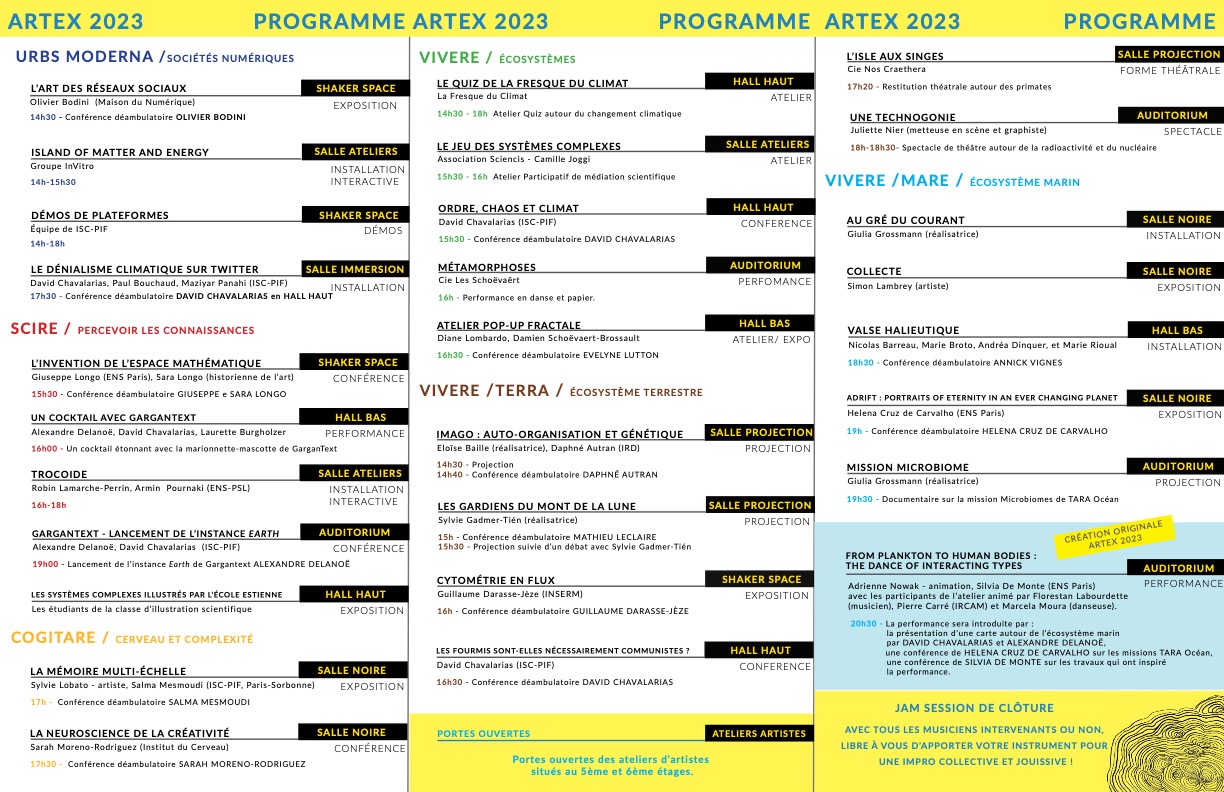As part of their Emergences – Ars Sciences Recherche program, Transcultures – Pépinières de Création supports the ARTEX 2021 event offered by the Institute of Complex Systems of Paris Île-de-France (ISC-PIF), 3rd edition of the “Journée Arts & Science of Complex Systems ”, as part of the Science Festival 2021. A Nursery grant will be awarded to the Laureate who wins the public vote for his project.
Since 2014, the Institut des Systèmes Complexes de Paris IdF has been organizing the event “ARTEX: Arts and Sciences Day of Complex Systems”, a biennial scientific and cultural event that brings together arts and sciences on the theme of complex systems. This day organized on the occasion of the Fête de la Science aims to introduce the general public to the different facets of research on Complex Systems and to share with them the keys to better understand and apprehend the complexity of the systems that surround. At each edition, researchers and artists join forces with ARTEX to take up a major challenge: popularize complexity!
Although complex systems issues are at the heart of science and society debates – networks of influence on Twitter, sustainability of ecosystems, spread of an epidemic, urban sprawl – there are still few initiatives to popularize and mediate complex systems. intended for the general public. The ISC-PIF believes that the exchange and dialogue on these themes between researchers, public authorities and citizens is essential. This is why the Institute has decided to launch an arts and sciences biennial devoted to complex systems on the occasion of the Fête de la Science.
The dialogue between art and science has been part of the identity of ISC-PIF since its creation. Because they are interactive, innovative and visual, the devices developed at ISC-PIF fulfill the conditions for a dialogue with the artistic process. The installation Stalagmèmes developed by ISC-PIF with artists from Le Fresnoy and exhibited at the Palais de Tokyo in 2017, bears witness to this. In addition, the Institute shares its RIVP premises with artist workshops and the Musaïques association, which offers art therapy workshops for young people with disabilities. This event offers everyone the opportunity to explore new worlds and contribute to the dynamism of local cultural life.
INSTITUTE OF COMPLEX SYSTEMS OF PARIS ÎLE DE FRANCE

Created in 2005, ISC-PIF is a CNRS service and research unit dedicated to the inter-institutional and inter-disciplinary development of research on complex systems. At the same time research laboratory, project incubator, shared resource center, conference center and academic co-working space, this scientific third place provides researchers with a dynamic research environment and innovative tools based on big data and high performance computing.
A Scientific Hub
- Mutualised
Scientists who study complex systems face many theoretical, methodological and technological challenges every day. At ISC-PIF, we believes that these challenges can be tackled through increased collaboration between researchers from different disciplines. This is why we propose the pooling of technical resources and infrastructures on the scale of the scientific community, and encourage the development of free and open software as well as the sharing of data, publications and replicability practices.
- Innovative
Understanding complex systems requires specific resources for their modeling, simulation and mass data analysis. ISC-PIF offers to residents and scientists affiliated to its partners several tools to reduce these technological barriers:
- Infrastructures
Platforms and software (supercomputing, distributed computing, storage and big data mining)
High Performance Computing (Grid and Cloud).
- Inter-Instutional
ISC-PIF is at the heart of a scientific project recognised by the Île-de-France Region as a Domaine d’Intérêt Majeur (DIM) and supported by the City of Paris. This CNRS unit (UPS3611) brings together several of the most important institutional partners in France: CEA, EHESS, EPHE, ESPCI, INRAE, INSERM, IGN, Institut Curie, Institut Mines Télécom, MNHN, Université de Cergy-Pontoise, Université de Paris, Université Paris 1 – Panthéon Sorbonne, Sorbonne Université.
Infos
- 13.10.2023 | 14 > 23:00
- TOTEM
- 11, Place Nationale 75013, Paris
- Free – registration required
- iscpif.fr/artex
Production
- ARTEX is organized by the CNRS (Institut des Systèmes Complexes de Paris IdF) on the occasion of the Fête de la Science, an event proposed by the Ministry responsible for higher education, research and innovation.
- Support from the City of Paris, the RIVP and institutional partners : CEA, EHESS, ESPCI, INRAE, Institut Curie, Institut Mines-Télécom, Institut National de l’Information Géographique et Forestière, Museum National d’Histoire Naturelle, Sorbonne Université, Université de Cergy-Pontoise, Université de Paris, Université Paris I – Panthéon Sorbonne.
- With the support of Transcultures Europe – Pépinières de Création (European Pepinieres of Creation)
- iscpif.fr



